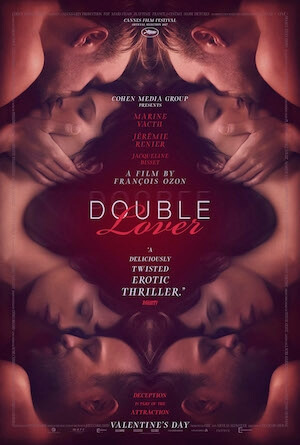The anatomy in question belongs to fragile, anxious, 25-year-old Chloé (Marine Vacth, star of Ozon’s Young & Beautiful), who’s investigating the mysterious, on-and-off abdominal pain she’s endured since childhood. Convinced the ailment must have a psychological source, the doctors recommend a therapist: Paul (Renier), compassionate and soft-spoken, the model of a good listener. Enraptured by his patient, Paul eventually trades a professional relationship for a romantic one, and the two are happy for a time, Chloé seemingly “cured” of her affliction. But then she stumbles into a shocking revelation: Her dream beau has a secret shadow, a twin brother who approaches his own psychiatry practice (and love life) much more aggressively. If Paul is almost a parody of the sensitive, enlightened modern man, Louis (Renier again) is his predatory opposite, a manipulative, negging womanizer who demands no separation between work and play, his office opening into an attached bedroom.
Renier, who’s turned in numerous naturalistic performances in the movies of Belgian filmmaking duo the Dardennes, clearly relishes the opportunity for scenery chewing that the roles afford him: Perfectly in sync with the devilish genre spirit, he plays the “good” brother’s subdued supportiveness against the “bad” brother’s malevolent alpha confidence, at one point even finding the opportunity to play one imitating the other. (It’s the best doppelgänger dual performance since, well, Michael Fassbender in Alien: Covenant.) The model for this dichotomy is, of course, David Cronenberg’s disturbing masterpiece Dead Ringers, still the quintessential cinematic depiction of twinhood. The parallels don’t stop with the conflicting personalities of the brothers; Ozon drops allusions into nightmares both recounted and depicted, while building to some gnarly, Cronenbergian body horror. But Double Lover plays more like if Brian De Palma remade Dead Ringers from the Geneviève Bujold character’s perspective. It’s more sleazy than clinical, more stealth comedy than creeping dread.
As Chloé slides into an illicit, dubiously therapeutic affair with Louis, Ozon exploits the perverse possibilities of his premise—and not just through the lingering threat/promise of some steamy Renier-on-Renier action. Double Lover inverts the fantasy fulfillment of another dead ringer for Dead Ringers, Denis Villeneuve’s eerily ponderous look-alike thriller Enemy, which found Jake Gyllenhaal’s buttoned-up academic swapping beds (and partners) with an identical stranger. Here, Chloé gets to satiate her appetite for two paradigms of masculinity: the gentleman and the brute, the white-knight savior and the objectifying scoundrel. It’s a little icky, this have-your-cake-and-eat-it-too scenario, as Ozon toys with the idea that Louis’ ravenous advances (he makes Christian Grey look like the picture of traditional chivalry) are what Chloé really wants and maybe needs. That’s a queasy notion now and always, even when complimented by scenes of Chloé asserting her own dominance by introducing violent pegging into her relationship with Paul. There’s a bit of Paul Verhoeven, too, in this energetic workout of the erotic thriller, but Double Lover doesn’t play with fire half as smartly or provocatively as Elle did.
Still, in Ozon’s hands, the material is such knowing pulp, drunk on its own arch luridness, that it resists any reading that treats the pathologies, or their implications, remotely seriously. Slick as the polished surfaces of its locations—museums, high-end restaurants, posh high-rise apartments and offices—Double Lover steadily disappears down a whirlpool of kinky sex, melodramatic mystery, Grand Guignol gore, and what’s-real-and-what’s-not narrative gamesmanship. Ozon dresses up his tasteless pleasures in tasteful Euro-highbrow couture (the film premiered in competition at Cannes last year, hilariously), and virtuosically twists his camera up long staircases and straight down esophaguses, creating spiraling openings everywhere, because this is very much a film about going inside, in a prurient and a psychological sense. And because it’s also a film about twins, there are more mirrors than you can count: peeking out from every odd corner of every room, sometimes facing each other to create an infinite repeating reflection into oblivion. Double Lover is trash, but it’s delirious premium trash—and for the right kind of moviegoer, perfect date-night counterprogramming, answering the sappiness of this February holiday season with its own sticky perversity.

























![Rob Reiner's son booked for murder amid homicide investigation [Updated]](https://img.pastemagazine.com/wp-content/avuploads/2025/12/15131025/MixCollage-15-Dec-2025-01-10-PM-9121.jpg)















